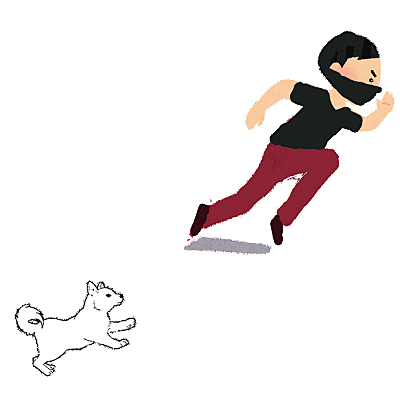If you are not at B2 level, I suggest you do not read it; otherwise, you are going to confuse yourself a lot. This article is written for students who have learned many different usages of direction complements from A2 to B2.
If you are not familiar with what a direction complement is, I suggest you read the following links.
📖 Basic Direction Complement
📖 Compound direction complements
T.M.I
The following usages are not all used as compound direction complements.
Lots of my students get confused about the following functions and wonder how to use them, so I just put them together for your reference.
Warning! Some sentences here might be a little wired…maybe very wired, that’s because I was watching Dexter while I wrote this article.
起 (qǐ)
1. An action leads something to happen
森林裡燃起大火
森林里燃起大火
Sēnlín lǐ ránqǐ dàhuǒ.
The forest get fire.
表演結束後台下響起掌聲
表演结束后台下响起掌声
Biǎoyǎn jiéshùhòu táixià xiǎngqǐ zhǎngshēng.
Applause broke out in the hall after the show.
2. Can afford: with 得(de) or 不(bù)
我讀不起那間學校
我读不起那间学校
Wǒ dú bù qǐ nà jiān xuéxiào.
I can’t afford the tuition of that school.
他買得起台北的房子
他买得起台北的房子
Tā mǎi dé qǐ táiběi de fángzi.
He can afford to buy a house in Taipei.
起來/起来 (qǐlái)
1. Bring things together
加起來
加起来
Jiā qǐlái.
Add up
把這些餡都包起來
把这些馅儿都包起来
Bǎ zhèxiē xiàn dōu bāo qǐlái
Bǎ zhèxiē xiàn ér dōu bāo qǐlái.
Wrap all the filling.
2. An action begins and continues a state: V 起 (O) 來/来
突然下起雨來了
突然下起雨来了
Tū rán xià qǐ yǔ lái le.
Suddenly it started to rain.
因為我的求婚,我女朋友哭起來了
因为我的求婚,我女朋友哭起来了
Yīnwèi wǒde qiúhūn ,wǒ nǚpéngyǒu kū qǐlái le
My girlfriend started to cry because of my purpose.
📚 The differences between V 起 (O) 來/来 and 開始/开始V:
The first one focuses on the description when you explain a situation or tell a story (usually in the past), whereas, the second one emphasizes one’s decision or the start time point (usually now.)

天啊!外面開始下雨了,不知道爸爸有沒有傘
天啊!外面开始下雨了,不知道爸爸有没有伞
Tiān a! Wàimiàn kāishǐ xià yǔle, bù zhīdào bàba yǒu méiyǒu sǎn.
Gosh! It starts to rain. I don’t know if Dad has an umbrella with him.
(Emphasize the start time point )
就在我走出去的時候,突然下起雨來了
就在我走出去的时候,突然下起雨来了
Jiù zài wǒ zǒu chūqù de shíhòu, tū rán xià qǐ yǔ lái le.
When I just walked out, suddenly it started to rain.
(Telling the situation)
3. Estimate or judge
說起來容易,做起來難
说起来容易,做起来难
Shuō qǐlái róngyì ,zuò qǐlái nán.
Easier said than done.
你做的菜吃起來很奇怪
你做的菜吃起來很奇怪
Nǐ zuòde cài chī qǐlái hěn qíguài.
The dishes you made taste weird.
上 (shàng)
1. “Get closer to”

狗追上了小偷
狗追上了小偷
Gǒu zhuī shàng le xiǎotōu.
The dog catches up with the thief.
小心跟上(我)
小心跟上(我)
Xiǎoxīn gēn shàng (wǒ)
Follow me and be careful!
2. From open to close
閉上眼睛
闭上眼睛
Bìshàng yǎnjīng
Close your eyes.
關上心門
关上心门
Guānshàng xīnmén
Close oneself off.
3. Make sth exist somewhere
寫上你的名字
写上你的名字
Xiěshàng nǐde míngzi.
Write down your name.
我在他的墓前插上了一朵花
我在他的墓前插上了一朵花
Wǒ zài tāde mùqián chāshàngle yìduǒ huā.
I put a flower in front of his tomb.
4. Achieve a difficult goal
他終於當上警長了
他终于当上警长了
Tā zhōngyú dāngshàng jǐngzhǎng le.
He finally become a sheriff.
犯人被處死後他也報上仇了
犯人被处死后他也报上仇了
Fànrén bèi chùsǐ hòu tāyě bàoshàngchóu le.
After the criminal was sentenced to capital punishment, the victim finally felt like he had gotten his revenge.
5. “Up to; as many as”
發現的屍體已上百
发现的尸体已上百
Fāxiàn de shītǐ yǐ shàng bǎi.
Up to a hundred bodies have already been found.
我的中文比你好上100倍
Wǒde zhōngwén bǐ nǐ hǎoshàng 100 bèi.
My Chinese is one hundred times better than yours.
6. Wearing; put on
穿上衣服
Chuān shàng yīfú
Put on the clothes.
7. Add
算上我吧!
Suàn shàng wǒ ba!
Count me in!
下 (xià)
1. Capacity for holding or containing
這個袋子裝得下兩個人嗎?
这个袋子装得下两个人吗?
Zhège dàizi zhuāng de xià liǎngge rén ma ?
Can this bag hold two people?
我的心容不下你
Wǒde xīn róng bú xià nǐ.
I’ve got no room for you.
2. Fix or set Sth somewhere
我對她留下了深刻的印象
我对她留下了深刻的印象
Wǒ duì tā liúxià le shēnkède yìnxiàng.
I was strongly impressed by her.
你需要記下我說的話
你需要记下我说的话
Nǐ xūyào jìxià wǒ shuōde huà.
You need to remember what I said.
(set my words in your memory)
📚 The differences between V上 and V下:
Make sth exist somewhere
請寫上你的名字
请写上你的名字
Qǐng xiě shàng nǐ de míngzi
Write down your name, please. (“Exist” usually means it will keep for a long time.)
For these situations we would use 上 (shàng) :
On a contract, on a test paper, on a form
Fix or set Sth somewhere
請寫下你的名字
请写下你的名字
Qǐng xiě xià nǐ de míngzi.
Write down your name, please. (It’s simply asking you to write down your name, so someone can see or check.)
For the following situations we prefer to use下(xià)
On a paper (leaving a message), on the whiteboard
過/过 (guò)
1. From one place to another place
我接過信
我接过信
Wǒ jiēguò xìn.
I received the letter. (From other people’s hand to my hand.)
2. The object follow action to change directions
我轉過頭,打了他一巴掌
我转过头,打了他一巴掌
Wǒ zhuǎnguò tóu,dǎle tā yì bāzhǎng.
I turn my head around and slap him.
我翻過身,繼續睡
我翻过身,继续睡
Wǒ fānguò shēn ,jìxù shuì.
I turn around and keep on sleep.
3. Over an appropriate point
我睡過頭了
我睡过头了
Wǒ shuìguò tóu le
I overslept.
坐過站了
坐过站了
Zuòguò zhàn le
I passed my station.
📖 Advance direction complements I (來/来lái, 去qù, 進/进jìn, 出chū)

